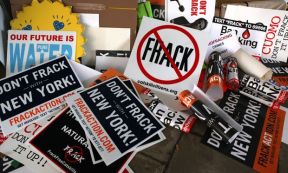The New York Court of Appeals upheld the ruling of a lower court that local governments have the authority to decide how land is used, which includes deciding whether or not fracking and drilling should be allowed on that land. The plaintiffs in those lawsuits argued that New York’s oil, gas and mining law takes precedence over local zoning laws, but in rulings both by a lower court and now the Court of Appeals, that claim was overturned.
Two New York towns—Middlefield and Dryden—that previously banned fracking were the focus of the lawsuits, but the ruling means that now other municipalities in New York can pass laws that ban fracking and drilling. So far, activists say, 170 towns and cities in New York have passed fracking bans or moratoria.

“Today the Court stood with the people of Dryden and the people of New York to protect their right to self determination. It is clear that people, not corporations, have the right to decide how their community develops,” Dryden Deputy Supervisor Jason Leifer said in a statement.
In the majority opinion, Associate Judge Victoria Graffeo wrote that the ruling wasn’t about whether or not fracking was good for New York—it was about the balance of power between state and local government.
“These appeals are not about whether hydrofracking is beneficial or detrimental to the economy, environment or energy needs of New York, and we pass no judgment on its merits,” she wrote. “The discrete issue before us, and the only one we resolve today, whether the State Legislature eliminated the home rule capacity of municipalities to pass zoning laws that exclude oil, gas and hydrofracking activities in order to preserve the existing character of their communities.”
The battle over the two towns’ fracking bans began in 2011, when an oil-and-gas company first challenged Dryden’s ban on fracking. Not long after, landowner Cooperstown Holstein Corp. challenged Middlefield’s ban.
The state of New York has had a fracking moratorium in effect since 2008, to give the state time to study the practice. Gov. Andrew Cuomo has said he won’t decide whether or not to extend the ban until the state’s health impact review is completed.





